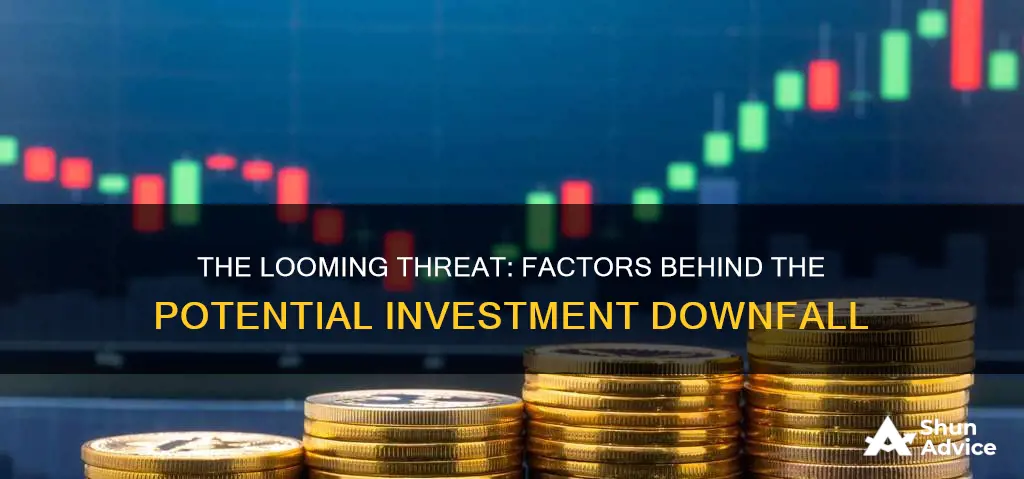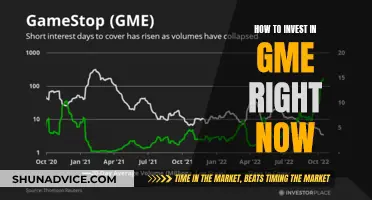
There are many factors that can cause investments to fall, and understanding these is crucial for investors to make informed decisions. Firstly, economic downturns, such as recessions, can lead to declining income and employment, causing stock prices to plummet. External events like invasions, supply shocks, or consumer spending drops due to inflation can also trigger downturns. Additionally, interest rate changes can impact investments. When the economy is booming, central banks may raise interest rates, making borrowing more expensive for businesses, which may lead to reduced investment and hiring. This, in turn, can lower consumer spending and stock values.
Furthermore, company-specific factors, such as earnings reports, new product launches, or management changes, can influence stock prices. Industry performance also plays a role, as news affecting one company in an industry may spill over to its competitors. Investor sentiment is another critical factor, as market confidence can cause stock prices to rise or fall. Inflation and changes in economic policy can also impact investment returns. Finally, global events like energy cost increases or acts of terrorism can lead to economic downturns and falling stock prices.
| Characteristics | Values |
|---|---|
| Recession | Income and employment decline, stock prices fall |
| Interest rates | When interest rates rise, bond prices fall |
| Inflation | Inflation slows sales and reduces profits |
| Deflation | Falling prices mean lower profits for companies and decreased economic activity |
| Economic and political shocks | A rise in energy costs can lead to lower sales, lower profits and lower stock prices |
| Changes in economic policy | Changes in economic policy can affect inflation and interest rates, which in turn affect stock prices |
| Value of currency | A rise in the value of a country's currency can drive down sales, leading to lower stock prices |
What You'll Learn

Interest rate changes
Interest rates and investments are closely linked, and changes in interest rates can have ripple effects throughout the economy. The Federal Reserve (the Fed) adjusts interest rates to promote maximum employment, stable prices, and moderate long-term interest rates. While interest rate changes do not directly affect the stock market, they can have indirect effects on stock prices.
When the Fed raises interest rates, banks increase their rates for consumer and business loans, leaving consumers with less money to spend. This can lead to reduced consumer and business spending, which can lower the value of a company's stock. Additionally, higher lending costs may cause businesses to borrow and invest less, potentially halting expansions and hires.
On the other hand, when the Fed lowers interest rates, it makes borrowing cheaper, which can spur businesses to invest in projects and hire more employees, leading to increased consumer income and spending. Lower interest rates can also make stocks more attractive compared to other investments, such as bonds.
The impact of interest rate changes on investments can vary depending on the type of investment. For example, interest rates and bonds have an inverse relationship, meaning that when interest rates rise, bond prices fall, and vice versa. In contrast, higher interest rates on savings accounts and certificates of deposit (CDs) can lead to higher annual percentage yields (APY).
It's important to note that the relationship between interest rates and the stock market is fairly indirect, and there is no guarantee how the market will react to any given interest rate change. However, as a general rule of thumb, when the Fed cuts interest rates, it tends to cause the stock market to go up, while raising interest rates can cause the market to go down.
Mortgage Applicants: Lying About Investment Properties
You may want to see also

Inflation
Impact on Fixed Income Investments
Fixed-income investments, such as corporate or municipal bonds, treasuries, and certificates of deposit (CDs), are significantly impacted by inflation. These investments offer a stable income stream through interest payments. However, when inflation rises, the purchasing power of these interest payments declines. As a result, investors effectively experience a lower real rate of return on their investment. For example, consider a one-year bond with a $1,000 face value that offers a 5% nominal interest rate. If the inflation rate is 3%, the investor's real rate of return is only 2%, and the real value of the returned principal investment is reduced.
Effect on Stock Returns
Impact on Cash and Savings
Effect on Real Assets
While real assets, such as commodities and real estate, tend to have a positive relationship with inflation in the short term, they may not provide reliable long-term protection. Commodities, for instance, tend to be more volatile than other asset classes, do not produce income, and have historically underperformed stocks and bonds over more extended periods. While property owners may increase rent payments in line with inflation, contributing to higher profits and investor distributions, the impact of inflation on the wider economy may offset these gains.
Strategies to Mitigate Inflation's Impact
To defend your portfolio against inflation, consider diversifying your investments by including exposure to U.S. stocks and real assets. Additionally, explore Treasury Inflation-Protected Securities (TIPS), which offer a rate of return adjusted according to the Consumer Price Index (CPI). While TIPS may provide more reliable returns than other bonds, their returns and income tend to be relatively low.
Gamestop Investors: Who's In?
You may want to see also

Recession
A recession is a significant and widespread decline in economic activity, typically lasting several months or more. It is often defined as two or more consecutive quarters of a decline in real gross domestic product (GDP). During a recession, income and employment decline, and stock prices fall as companies struggle to maintain profitability. This can lead to a vicious cycle of economic contraction as rising unemployment pushes consumer spending down further.
The impact of a recession on investors depends on their situation and type. Some investors take advantage of falling markets through short-selling, a technique that should only be used by sophisticated investors due to its unique risks. Another type of investor views a recession as an opportunity to buy high-quality companies at a bargain, a strategy known as value investing.
During a recession, riskier assets like stocks and high-yield bonds tend to lose value, while gold and U.S. Treasuries appreciate. Shares of large companies with ample and steady cash flows and dividends tend to outperform stocks in more economically sensitive sectors. The consumer staples sector, which includes food, beverages, household goods, alcohol, tobacco, and toiletries, typically outperforms during recessions as consumers continue to purchase these essential items regardless of economic conditions.
While recessions can be scary for investors, they are a normal part of a functioning economy. It is important for investors to develop a strategy for dealing with risks based on their financial situation. Recessions do not last forever, and they can present opportunities to buy securities at discounted prices.
Biden's Retirement Investment Rule: A Game-Changer for Americans' Golden Years
You may want to see also

Investor sentiment
Additionally, investor sentiment can be impacted by specific company news and performance. Positive news such as earnings reports, new product launches, or large contracts can boost investor sentiment for a particular company, leading to increased demand for its stock. Conversely, negative news such as accounting scandals, management changes, or product recalls can cause investor sentiment to deteriorate, potentially leading to a decline in the company's stock price.
It's important to note that investor sentiment can be fickle and subject to overreaction. Short-term fluctuations in stock prices may not always align with the underlying fundamentals of a company or the broader economy. Therefore, it is crucial for investors to make informed decisions based on their financial goals, risk tolerance, and time horizon, rather than solely relying on the prevailing investor sentiment.
Moreover, investor sentiment can be influenced by interest rate changes. When the Federal Reserve raises interest rates to curb inflation or cool down an overheating economy, it can lead to reduced consumer and business spending, potentially impacting stock prices. On the other hand, lowering interest rates can make borrowing more affordable, encouraging businesses to invest in new projects and hire more employees, which can have a positive effect on the stock market.
Note Investing: Exploring the Payment Methods
You may want to see also

Company news and performance
Positive News
Good earnings reports, new product announcements, corporate acquisitions, and positive economic indicators all translate into buying pressure and an increase in stock prices. For example, if a company reports a significant year-over-year increase in its quarterly earnings, it reflects positively on the company's performance and can lead to a rise in its stock price.
Negative News
On the other hand, negative news such as bad earnings reports, lapses in corporate governance, economic and political uncertainty, and unfortunate events will typically lead to selling pressure and a decrease in stock prices. For instance, if a company issues an earnings report that falls short of expectations, it can result in a downgrade of its stock value.
Other Factors
The impact of news on stock prices is also influenced by factors such as market sentiment, expectations, and the timing of results. When market sentiment is poor, investors tend to sell their stocks regardless of company-specific positive news. Additionally, if the market expects outstanding results but the actual outcomes are only satisfactory, it can lead to a share price drop as speculators exit their positions.
Furthermore, the art of valuing a stock goes beyond the science of modelling its price based on estimated expectations and actual results. External influences, such as macroeconomic factors like rising interest rates or sector-specific developments, can also play a significant role in stock price movements.
Stable Interest Rates: Investors' Confidence Boost?
You may want to see also
Frequently asked questions
There are several factors that can cause investments to fall. Here are some of the key ones:
- Recession: During a recession, income and employment decline, and companies struggle to maintain profitability, leading to a fall in stock prices.
- Interest Rate Hikes: When the economy is growing, central banks may raise interest rates to curb inflation. This increases lending costs for businesses, causing them to borrow and invest less, which can lead to a fall in investment.
- Company News and Performance: Negative news about a company, such as earnings reports, product recalls, or management changes, can cause its stock price to fall.
- Industry Performance: Issues affecting an entire industry can lead to a decline in investment. For example, if a product from one company is deemed unsafe, it may affect other companies producing similar products.
- Investor Sentiment: Investor confidence can impact the market. A "bear market", characterised by falling stock prices and fading investor confidence, can be caused by economic recession, high unemployment, and rising prices.
Interest rate changes can impact investments in various ways:
- Bonds: Interest rates and bond prices have an inverse relationship. When interest rates rise, bond prices fall, and vice versa.
- Stocks: While interest rate changes don't directly affect the stock market, they can have indirect effects. Higher interest rates may lead to reduced consumer and business spending, which can lower the value of a company's stock.
- Savings and CDs: An increase in interest rates may lead to higher annual percentage yields on savings accounts and certificates of deposit (CDs), making them more attractive to investors.
- Commodities: Commodity prices tend to fall when interest rates rise, creating an unfavourable climate for commodity investments.
- Real Estate: Interest rate hikes can be detrimental to real estate investments as higher financing costs may lead to reduced demand and lower real estate prices.
During a recession, stock prices typically plummet, and the markets can be volatile. However, some investors view recessions as an opportunity:
- Short Selling: Sophisticated investors may short sell stocks, benefiting from falling share prices.
- Value Investing: Some investors treat recessions like a sale, scooping up high-quality companies at bargain prices, betting on better times ahead.
- Long-Term Strategy: Long-term investors may barely react to a recession, knowing that short-term problems are insignificant over a 20-30 year horizon.
When interest rates fall, it may be a good time to make changes to your stock portfolio:
- Lock in Long-Term Investments: Buying longer-term fixed-income holdings can help maintain a stable cash flow and lock in higher interest rates.
- Take on More Risk: Consider more aggressive fixed-income investments, such as REITs, limited partnerships, or preferred stocks, which offer higher interest rates but carry more risk.
- Buy Utility, Healthcare, and Consumer Staples Stocks: These sectors tend to be stable during falling interest rates and often pay high dividends.
- Buy Commodities: Falling interest rates can weaken the domestic currency, boosting commodity prices and providing an opportunity for short-term profits.
- Refinance Debt: Falling interest rates make debt cheaper. Consider refinancing your mortgage or loans to offset any reduction in investment income.
Here are some steps to consider if you're concerned about the performance of your investments:
- Long-Term Perspective: Evaluate the situation in the context of your long-term investment plan. Volatility is normal and becomes less significant over time. Ensure you have cash reserves for emergencies.
- Speak to a Financial Adviser: Discuss your concerns and review your investments to ensure they align with your original goals and risk tolerance.
- Diversification: A well-diversified portfolio containing shares, bonds, property, and cash (both domestic and global) can help generate strong long-term returns and minimise risk.
- Don't Make Emotional Decisions: It's natural to want to take action, but emotional decisions are often irrational. Sleep on it, don't rush, and consult your adviser.







